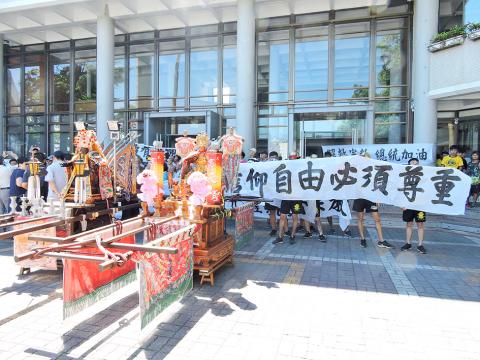Due to controversy over a draft religious basic act, the Legislative Yuan’s Internal Administration Committee decided to cancel a scheduled review scheduled for yesterday.
The draft act was sponsored by Chinese Nationalist Party (KMT) legislators Wang Jin-pyng (王金平), Huang Chao-shun (黃昭順) and Ma Wen-chun (馬文君), as well as Democratic Progressive Party (DPP) Legislator Lin Tai-hua (林岱樺), and cosigned by more than 30 legislators across party lines.
Article 10 of the bill would have established a principle of separation of religion and secularism, and forbidden the governing authorities from interfering in religious affairs.

Photo: Chang Tsun-wei, Taipei Times
The same article would have prevented the courts from mediating religious affairs, or interfering with the organizing of religious groups and the appointing of group personnel.
Article 13 would have prevented the government from restricting or prohibiting religious activities and would have given religious groups autonomy in terms of their organizational structure, personnel and financial management.
Most importantly, it would have made religious groups exempt from the Civil Code and the oversight of agencies that supervise charity groups and foundations, as well as prohibiting the government from making religious groups conform to the principles of democracy and transparency.
Article 14 proposed that religious groups be exempt from upholding the prohibition against religious discrimination in the Employment Service Act (就業服務法).
Article 15 would have given parents and legal guardians the right to choose a religion for minors.
Article 27 would have given religious groups with a building on government-owned land that had been in use for more than five years prior to the bill’s enactment the ability to apply to purchase the land.
The DPP caucus yesterday expressed its opposition to the draft.
Several DPP legislators who had originally supported the draft had already withdrawn their cosponsorship, DPP caucus convener Ker Chien-ming (柯建銘) said.
Wang has withdrawn as a bill sponsor.
The DPP caucus hoped that society would be given the opportunity to form a consensus on the regulation of religious groups, and did not want to conduct a hasty review, Ker said.
The caucus did not want to see religious groups smeared due to the chaos surrounding the bill’s review, he said.
The draft does not give an advantage to any group or individual, Huang said, adding that she was disappointed that some legislators accused religious groups of becoming involved with Chinese money-laundering groups as part of Beijing’s “united front” tactics.
The review was canceled so that religion would not become politicized and tainted in Taiwan, she said.
As several articles in the bill are controversial, the Ministry of the Interior is not voicing an opinion, the ministry’s Department of Civil Affairs Director Lin Ching-chi (林清淇) said.
Lin said there was no need for a basic religious act, because the Constitution already guarantees religious freedom.
The DPP and the New Power Party caucuses have proposed to return the draft to the Legislative Yuan’s plenary session for further deliberation.
Deputy Legislative Speaker Tsai Chi-chang (蔡其昌) said a new date should be set to deal with the act.

MAKING WAVES: China’s maritime militia could become a nontraditional threat in war, clogging up shipping lanes to prevent US or Japanese intervention, a report said About 1,900 Chinese ships flying flags of convenience and fishing vessels that participated in China’s military exercises around Taiwan last month and in January have been listed for monitoring, Coast Guard Administration (CGA) Deputy Director-General Hsieh Ching-chin (謝慶欽) said yesterday. Following amendments to the Commercial Port Act (商港法) and the Law of Ships (船舶法) last month, the CGA can designate possible berthing areas or deny ports of call for vessels suspected of loitering around areas where undersea cables can be accessed, Oceans Affairs Council Minister Kuan Bi-ling (管碧玲) said. The list of suspected ships, originally 300, had risen to about 1,900 as

Right-wing political scientist Laura Fernandez on Sunday won Costa Rica’s presidential election by a landslide, after promising to crack down on rising violence linked to the cocaine trade. Fernandez’s nearest rival, economist Alvaro Ramos, conceded defeat as results showed the ruling party far exceeding the threshold of 40 percent needed to avoid a runoff. With 94 percent of polling stations counted, the political heir of outgoing Costa Rican President Rodrigo Chaves had captured 48.3 percent of the vote compared with Ramos’ 33.4 percent, the Supreme Electoral Tribunal said. As soon as the first results were announced, members of Fernandez’s Sovereign People’s Party

MORE RESPONSIBILITY: Draftees would be expected to fight alongside professional soldiers, likely requiring the transformation of some training brigades into combat units The armed forces are to start incorporating new conscripts into combined arms brigades this year to enhance combat readiness, the Executive Yuan’s latest policy report said. The new policy would affect Taiwanese men entering the military for their compulsory service, which was extended to one year under reforms by then-president Tsai Ing-wen (蔡英文) in 2022. The conscripts would be trained to operate machine guns, uncrewed aerial vehicles, anti-tank guided missile launchers and Stinger air defense systems, the report said, adding that the basic training would be lengthened to eight weeks. After basic training, conscripts would be sorted into infantry battalions that would take

GROWING AMBITIONS: The scale and tempo of the operations show that the Strait has become the core theater for China to expand its security interests, the report said Chinese military aircraft incursions around Taiwan have surged nearly 15-fold over the past five years, according to a report released yesterday by the Democratic Progressive Party’s (DPP) Department of China Affairs. Sorties in the Taiwan Strait were previously irregular, totaling 380 in 2020, but have since evolved into routine operations, the report showed. “This demonstrates that the Taiwan Strait has become both the starting point and testing ground for Beijing’s expansionist ambitions,” it said. Driven by military expansionism, China is systematically pursuing actions aimed at altering the regional “status quo,” the department said, adding that Taiwan represents the most critical link in China’s